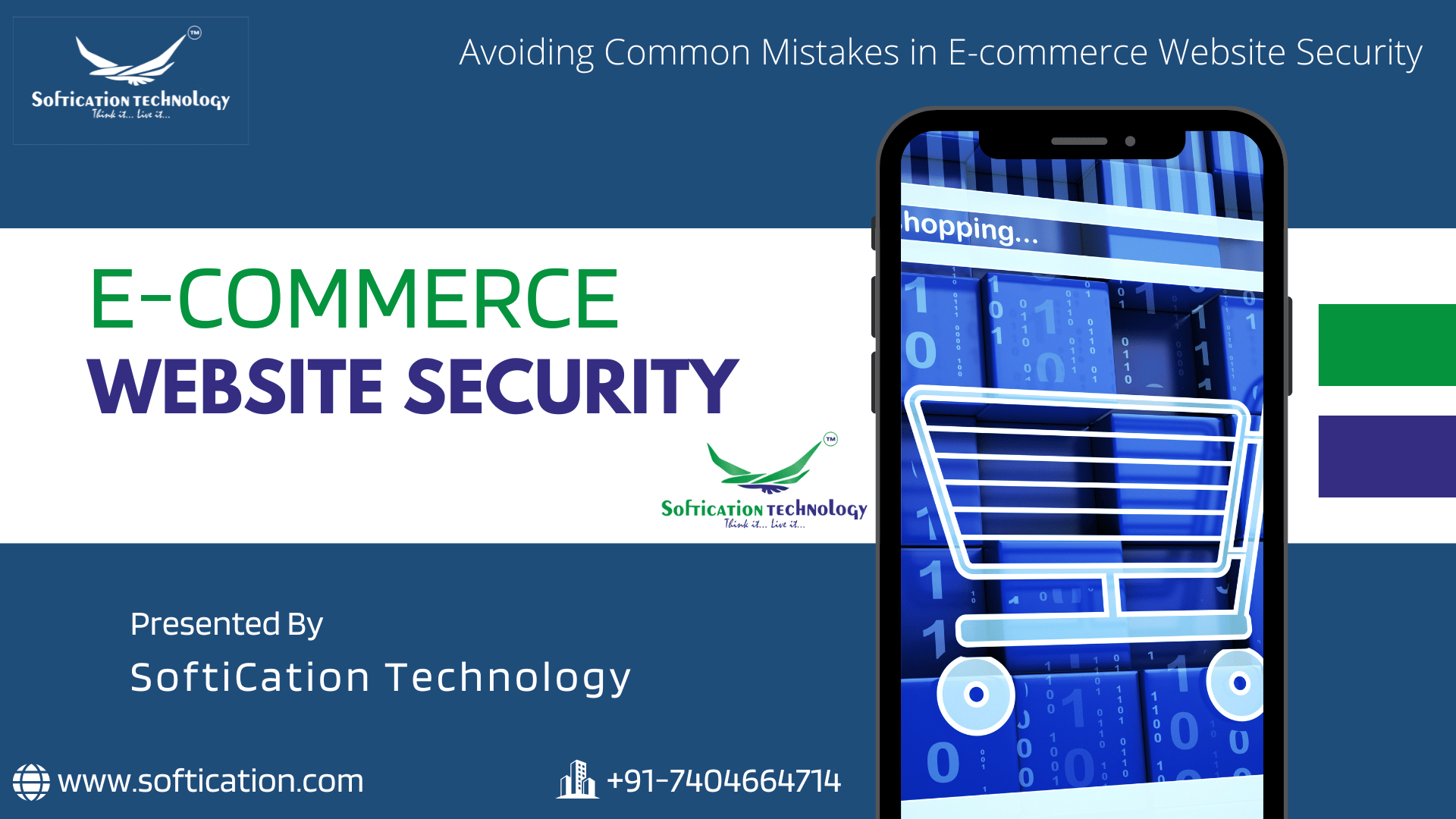Importance of E-commerce Website Security
In the world of e-commerce, website security is of utmost importance. Understanding the risks involved and the potential impact of security breaches is crucial for both businesses and consumers.
Understanding the Risks
E-commerce websites handle sensitive customer information, including personal details, payment information, and order history. This makes them attractive targets for cybercriminals seeking to exploit vulnerabilities for financial gain. Some of the common risks associated with e-commerce website security include:
- Data Breaches: Hackers may gain unauthorized access to the website's database, compromising customer information.
- Phishing Attacks: Cybercriminals may attempt to deceive customers into sharing their personal and financial information by posing as a legitimate e-commerce website.
- Payment Card Fraud: Insecure payment gateways can lead to the interception of payment card details, resulting in fraudulent transactions.
- Website Defacement: Hackers may deface the website, causing reputational damage and loss of customer trust.
- Malware Infections: E-commerce websites can be infected with malware that can steal customer data or disrupt website functionality.
The Impact of Security Breaches
The consequences of security breaches can be severe, affecting both businesses and customers. Some of the notable impacts include:
- Financial Loss: Businesses may incur financial losses due to stolen customer data, fraudulent transactions, and reputational damage.
- Loss of Customer Trust: Security breaches can erode customer trust, leading to a decline in sales and customer loyalty.
- Legal and Regulatory Consequences: Businesses may face legal consequences and regulatory fines for failing to protect customer data as required by privacy laws.
- Operational Disruption: Security incidents can disrupt website operations, leading to downtime, loss of revenue, and damage to the brand's reputation.
- Recovery Costs: Recovering from a security breach can be expensive, involving forensic investigations, remediation efforts, and implementing robust security measures.
To ensure the security of e-commerce websites, businesses must prioritize implementing best practices and adopting robust security measures. By doing so, they can protect their customers, their brand reputation, and their bottom line.
Common Mistakes in E-commerce Website Security
Ensuring the security of your e-commerce website is of paramount importance to protect sensitive customer information and maintain the trust of your users. Unfortunately, there are common mistakes that can compromise the security of your e-commerce website. It's crucial to be aware of these pitfalls and take appropriate measures to mitigate them.
Weak Passwords and Poor Authentication
Using weak passwords or implementing poor authentication practices is a common mistake that can leave your e-commerce website vulnerable to security breaches. Weak passwords are easier for hackers to crack, granting them unauthorized access to your website and customer data. Additionally, poor authentication practices, such as not implementing multi-factor authentication, can make it easier for attackers to gain unauthorized access.
To address this issue, it's essential to enforce strong password policies for both your customers and website administrators. Encourage the use of complex passwords that include a combination of uppercase and lowercase letters, numbers, and special characters. Implementing multi-factor authentication adds an extra layer of security by requiring users to provide additional verification, such as a one-time password sent to their mobile device.
Lack of Regular Updates and Patching
Failing to regularly update your e-commerce website and apply security patches is another common mistake that can leave your website exposed to vulnerabilities. Software developers constantly release updates and patches to address newly discovered security flaws. By neglecting to update your website, you leave it susceptible to known vulnerabilities that hackers can exploit.
To mitigate this risk, it's crucial to regularly update your e-commerce platform, content management system, plugins, and any other software components that your website relies on. Set up automatic updates whenever possible and ensure that your website is running on the latest stable versions. Regularly monitor security advisories and patch any identified vulnerabilities promptly.
Insufficient Data Encryption
Data encryption plays a vital role in protecting sensitive information transmitted between your e-commerce website and its users. Failing to implement proper data encryption can expose customer data to interception and unauthorized access.
To enhance the security of your e-commerce website, ensure that all sensitive information, such as customer payment details and personal data, is encrypted using industry-standard encryption protocols, such as SSL (Secure Sockets Layer) or TLS (Transport Layer Security). This encryption ensures that data transmitted between your website and users' browsers remains secure and confidential.
Inadequate Firewall Protection
A firewall serves as the first line of defense against unauthorized access and malicious attacks on your e-commerce website. Inadequate firewall protection is a common mistake that can leave your website vulnerable to various security threats.
Ensure that your e-commerce website is protected by a robust and properly configured firewall. A firewall can help detect and block unauthorized access attempts, filter out malicious traffic, and provide an additional layer of protection against common cyber threats, such as distributed denial-of-service (DDoS) attacks.
Neglecting Regular Backups
Regularly backing up your e-commerce website is crucial in case of security incidents, data loss, or website malfunctions. Neglecting regular backups is a common mistake that can result in irreversible consequences if your website experiences a security breach or data loss.
Implement a regular backup routine to ensure that your e-commerce website's data, including customer information, transaction records, and product inventory, is securely backed up. Store backups in a separate location or on a remote server to mitigate the risk of data loss due to hardware failures, natural disasters, or cyberattacks.
By avoiding these common mistakes and implementing robust security measures, you can enhance the security of your e-commerce website and protect your customers' sensitive information. Remember to regularly assess and update your security practices to stay ahead of emerging threats and ensure a safe online shopping experience for your customers.
Best Practices for E-commerce Website Security
To ensure the security of your e-commerce website, it's crucial to follow best practices that protect your business and your customers' sensitive information. Implementing strong security measures can help safeguard against potential breaches and maintain the trust of your customers. Here are some essential best practices to consider:
Strong Password Policies
Implementing strong password policies is a fundamental step in enhancing the security of your e-commerce website. Encourage your users to create unique, complex passwords that include a combination of uppercase and lowercase letters, numbers, and special characters. Additionally, enforce regular password updates and discourage the reuse of passwords across different accounts. Educate your customers about the importance of strong passwords and provide guidelines to help them create secure credentials.
Regular Updates and Patching
Regularly updating and patching your e-commerce website's software is crucial for maintaining its security. Outdated software versions can contain vulnerabilities that cybercriminals can exploit. Stay up to date with the latest security patches and software updates provided by your website platform or content management system (CMS). Implement a process to regularly check for updates and ensure they are promptly applied to your website.
Robust Data Encryption
Data encryption is a vital component of e-commerce website security. Utilize robust encryption protocols, such as Secure Sockets Layer (SSL) or Transport Layer Security (TLS), to protect sensitive data during transmission. Implementing SSL certificates on your website ensures that data transmitted between your customers' browsers and your server remains encrypted and secure. This encryption helps safeguard sensitive information, including credit card details and personal data, from potential threats.
Effective Firewall Implementation
Implementing a robust firewall is crucial for protecting your e-commerce website from unauthorized access and malicious attacks. A firewall acts as a barrier between your website and potential threats, monitoring incoming and outgoing traffic and blocking suspicious activity. Configure your firewall to allow only necessary network traffic, minimizing the risk of unauthorized access to your website's backend systems.
Regular Data Backups
Regularly backing up your e-commerce website's data is essential for disaster recovery and business continuity. In the event of a security breach or data loss, having recent backups ensures that you can restore your website and minimize downtime. Implement a regular backup schedule that includes all critical website files, databases, and customer data. Store backups securely in separate locations, preferably off-site or in the cloud, to ensure their availability in case of physical damage or system failures.
By following these best practices, you can significantly enhance the security of your e-commerce website and protect your business and customers from potential security breaches. Implementing strong password policies, regular updates and patching, robust data encryption, effective firewall implementation, and regular data backups are essential steps toward maintaining a secure online presence.
Additional Security Measures
In addition to the common mistakes to avoid, several additional security measures can enhance the overall security of your e-commerce website. Implementing these measures can help safeguard your customers' sensitive information and protect your online business from potential threats.
Two-Factor Authentication
Two-factor authentication (2FA) adds an extra layer of security to your e-commerce website by requiring users to provide two forms of authentication before accessing their accounts. This typically involves something the user knows (like a password) and something the user possesses (like a unique verification code sent to their mobile device). By implementing 2FA, you can significantly reduce the risk of unauthorized access to customer accounts, adding an extra level of protection against potential security breaches.
Secure Socket Layer (SSL) Certificate
An SSL certificate is crucial for establishing secure communication between your e-commerce website and your customers' browsers. It encrypts the data transmitted between the two, ensuring that sensitive information, such as credit card details, cannot be intercepted by malicious individuals. By displaying the padlock symbol and using the "https" protocol in the website URL, an SSL certificate provides customers with confidence in the security of their transactions. It also helps improve your website's search engine ranking, as search engines prioritize secure websites. Consider obtaining an SSL certificate from a trusted certificate authority to protect your website's integrity and reassure your customers.
Intrusion Detection and Prevention Systems (IDPS)
Implementing an Intrusion Detection and Prevention System (IDPS) can help detect and prevent unauthorized access attempts or malicious activities on your e-commerce website. An IDPS monitors network traffic, analyzes patterns, and flags any suspicious behavior or known attack signatures. It can automatically block or alert administrators about potential threats, allowing for prompt action to be taken to mitigate the risks. By deploying an IDPS, you can proactively protect your website from various types of attacks, such as SQL injections, cross-site scripting (XSS), and distributed denial-of-service (DDoS) attacks.
Security Audits and Penetration Testing
Regular security audits and penetration testing are essential to assess the vulnerabilities of your e-commerce website and identify potential weaknesses that could be exploited by attackers. A security audit involves reviewing the entire website infrastructure, analyzing the existing security measures, and ensuring compliance with industry standards and best practices. Penetration testing, on the other hand, involves simulating real-world attacks to identify and exploit vulnerabilities in a controlled environment. Both these processes help identify areas that require improvement, allowing you to take proactive steps to enhance your website's security posture.
By implementing these additional security measures, you can fortify your e-commerce website against potential threats and provide your customers with a secure shopping experience. It is important to regularly review and update these security measures to stay ahead of evolving threats and ensure the ongoing protection of your online business and customer data.
Additional Security Measures
While following best practices for e-commerce website security is crucial, there are additional security measures that can further enhance the protection of your online store. Implementing these measures can help safeguard sensitive customer information and maintain the trust of your users. Let's explore some of these additional security measures:
Two-Factor Authentication
Two-factor authentication (2FA) adds an extra layer of security to your e-commerce website by requiring users to provide two forms of identification before gaining access. This typically involves combining something the user knows (such as a password) with something the user possesses (such as a unique code sent to their mobile device). By implementing 2FA, you can significantly reduce the risk of unauthorized access to your website and customer accounts.
Secure Socket Layer (SSL) Certificate
An SSL certificate is essential for securing data transmitted between your website and your customers' browsers. It encrypts sensitive information, such as credit card details and personal information, preventing unauthorized access during transmission. By displaying the padlock symbol and the https prefix in the website URL, an SSL certificate assures customers that their data is being transmitted securely.
Intrusion Detection and Prevention Systems (IDPS)
Intrusion Detection and Prevention Systems (IDPS) monitor your e-commerce website for any suspicious activity or unauthorized access attempts. These systems can detect and alert you to potential security breaches, allowing you to take immediate action to prevent further damage. IDPS can be configured to block or mitigate attacks automatically, protecting your website and customer data.
Security Audits and Penetration Testing
Regular security audits and penetration testing are essential to identify vulnerabilities in your e-commerce website. Security experts can conduct thorough assessments of your website's infrastructure, code, and configuration to uncover any potential weaknesses. Through penetration testing, they simulate real-world attacks to identify vulnerabilities that could be exploited by malicious actors. Addressing these vulnerabilities promptly helps ensure the ongoing security of your e-commerce website.
By implementing these additional security measures, you can fortify the protection of your e-commerce website and provide your customers with a secure online shopping experience. Remember, e-commerce security is an ongoing process, and staying proactive in identifying and addressing potential risks is key to maintaining a secure online presence.











